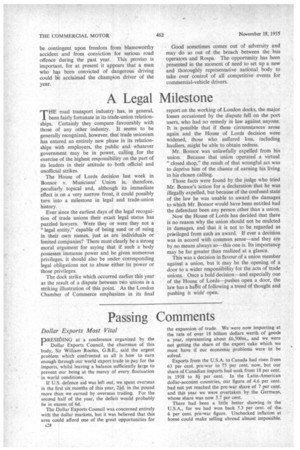A Legal Milestone
Page 30

If you've noticed an error in this article please click here to report it so we can fix it.
THE road transport industry has, in general, been fairly fortunate in its trade-union relationships. Certainly they compare favourably with those of any other industry. It seems to be generally recognized, however, that trade unionism has entered an entirely new phase in its relationships with employers, the public and whatever government may be in power, calling for the exercise of the highest responsibility on the part of its leaders in their attitude to both official and unofficial strikes.
The House of Lords decision last week in Bonsor v. Musicians' Union is, therefore, peculiarly topical and, although its immediate effect is on a very narrow front, it could possibly turn into a milestone in legal and trade-union history.
Ever since the earliest days of the legal recognition of trade unions their exact legal status has puzzled lawyers. Were they or were they not a "legal entity," capable of being sued or of suing in their own names, just as are individuals or limited companies? There must clearly be a strong moral argument for saying that if such a body possesses immense power and be given numerous privileges, it should also be under corresponding legal obligations not to abuse either its power or those privileges.
The dock strike which occurred earlier this year as the result of a dispute between tWo unions is a striking illustration of this point. As the London Chamber of Commerce emphasizes in its final report on the working of London docks, the major losses occasioned by the dispute fell on the port users, who had no remedy in law against anyone. It is possible that if these circumstances arose again and the House of Lords decision were widened, those who suffered loss, including hauliers, might be able to obtain redress.
Mr. Bonsor was unlawfully expelled from his union. Because that union operated a virtual "closed shop," the result of that wrongful act was to deprive him of the chance of earning his living in his chosen calling.
Those facts were found by the judge who tried Mr. Bonsor's action for a declaration that he was illegally expelled, but because of the confused state of the law he was unable to award the damages to which Mr. Bonsor would have been entitled had the defendant been any person other than a union.
Now the House of Lords has decided that there is no reason why the union should not be mulcted in damages, and that it is not to be regarded as priwileged from such an award. If ever a decision was in accord with common sense—and they are by no means always so—this one is. Its importance may be far greater than realized at a glance.
This was a decision in favour of a union member against a union, but it may be the opening of a door to a wider responsibility for the acts of trade unions. Once a bold decision—and especially one of the House of Lords—pushes open a door, the law has a hatit of following a trend of thought and pushing it wide open.




































































































